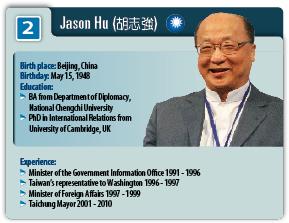Taichung Mayor Jason Hu’s (胡志強) sense of humor and affability have helped him to enjoy smooth sailing so far in his public service career.
After receiving a doctorate in international relations from the University of Cambridge in the UK, Hu returned to Taiwan to start his public career in the Chinese Nationalist Party (KMT)-controlled government. In 1991, Hu was appointed as minister of the Government Information Office, in 1996 he became Taiwan’s representative to Washington and two years later, Hu was appointed to the post foreign minister.
After the KMT lost power to the Democratic Progressive Party (DPP) in 2000 and drove most KMT heavyweights off the national political stage, Hu restarted his public service career by running in the mayoral election in Taichung.

He easily won the election in 2001 and was re-elected in 2005.
“Jason Hu is good at making friends and he has no enemies,” DPP Taichung City Councilor Huang Kuo-shu (黃國書) said.
Liao Da-chi (廖達琪), director of National Sun Yat-sen University’s Institute of Political Science agreed and said: “Hu has a good sense of humor. He always faces difficult or embarrassing situations with a sense of humor. People like him, the media like him, so he’s very popular.”
Many people were also touched by the affection Hu displayed publicly in November 2006, when he appealed to the public to pray for his wife, Shaw Hsiao-ling (邵曉鈴), who suffered injuries in a car accident.
Hu and his wife were returning from a campaign rally in -Kaohsiung when their minivan was hit by another vehicle that was trying to overtake Hu’s van on the hard shoulder. Hu was only hurt slightly in the accident, but Shaw was seriously injured.
Shaw survived two separate procedures in which doctors removed her ruptured spleen and amputated her left forearm.
Given his foreign affairs background, Liao said Hu knows how to promote Taichung on the international stage and bring greater visibility to Taichung.
“Hu has introduced many art and culture events to the city, which he calls ‘cultural construction,’ and I think that is his greatest achievement in office,” Liao said.
Hu himself has also highlighted his cultural endeavors in his re-election campaign.
“Every city has a face and Taichung’s face is a face of culture,” Hu said.
Hu claimed that in 2001, each Taichung resident attended an art or culture event less than four times a year, but in 2007 each residents attended 32 events on average.
However, both Liao and Wang Yeh-li (王業立), a political science professor at National Taiwan University, agreed that Hu failed to resolve the issue of public order in Taichung.
Taichung’s public order is regarded as the worst among the nation’s cities. Robberies and illegal dealings by gangsters are widespread, but the situation came into the spotlight earlier this year after several Taichung senior police officers were discovered to have close relations with local gangsters.
Wang also said while Taichung’s cultural aspects improved during Hu’s nine years in office, Hu had not overseen many impressive construction projects.
“Some people in Taichung have doubts, wondering whether the city will have a breakthrough if Hu is to be the mayor for another four years,” Wang said.
Our series of profiles of the candidates in the Nov. 27 special municipality elections continues tomorrow with the KMT mayoral candidate for Sinbei City, Eric Chu (朱立倫).

Alain Robert, known as the "French Spider-Man," praised Alex Honnold as exceptionally well-prepared after the US climber completed a free solo ascent of Taipei 101 yesterday. Robert said Honnold's ascent of the 508m-tall skyscraper in just more than one-and-a-half hours without using safety ropes or equipment was a remarkable achievement. "This is my life," he said in an interview conducted in French, adding that he liked the feeling of being "on the edge of danger." The 63-year-old Frenchman climbed Taipei 101 using ropes in December 2004, taking about four hours to reach the top. On a one-to-10 scale of difficulty, Robert said Taipei 101

Nipah virus infection is to be officially listed as a category 5 notifiable infectious disease in Taiwan in March, while clinical treatment guidelines are being formulated, the Centers for Disease Control (CDC) said yesterday. With Nipah infections being reported in other countries and considering its relatively high fatality rate, the centers on Jan. 16 announced that it would be listed as a notifiable infectious disease to bolster the nation’s systematic early warning system and increase public awareness, the CDC said. Bangladesh reported four fatal cases last year in separate districts, with three linked to raw date palm sap consumption, CDC Epidemic Intelligence

US climber Alex Honnold left Taiwan this morning a day after completing a free-solo ascent of Taipei 101, a feat that drew cheers from onlookers and gained widespread international attention. Honnold yesterday scaled the 101-story skyscraper without a rope or safety harness. The climb — the highest urban free-solo ascent ever attempted — took just more than 90 minutes and was streamed live on Netflix. It was covered by major international news outlets including CNN, the New York Times, the Guardian and the Wall Street Journal. As Honnold prepared to leave Taiwan today, he attracted a crowd when he and his wife, Sanni,

Two Taiwanese prosecutors were questioned by Chinese security personnel at their hotel during a trip to China’s Henan Province this month, the Mainland Affairs Council (MAC) said yesterday. The officers had personal information on the prosecutors, including “when they were assigned to their posts, their work locations and job titles,” MAC Deputy Minister and spokesman Liang Wen-chieh (梁文傑) said. On top of asking about their agencies and positions, the officers also questioned the prosecutors about the Cross-Strait Joint Crime-Fighting and Judicial Mutual Assistance Agreement, a pact that serves as the framework for Taiwan-China cooperation on combating crime and providing judicial assistance, Liang